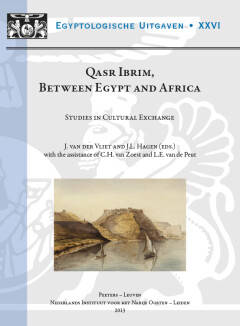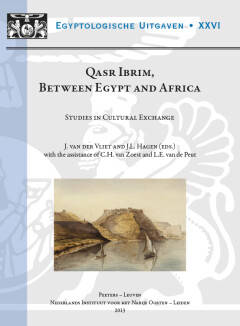
- Retrait gratuit dans votre magasin Club
- 7.000.000 titres dans notre catalogue
- Payer en toute sécurité
- Toujours un magasin près de chez vous
- Retrait gratuit dans votre magasin Club
- 7.000.0000 titres dans notre catalogue
- Payer en toute sécurité
- Toujours un magasin près de chez vous
Qasr Ibrim, Between Egypt and Africa
Studies in Cultural Exchange (Nino Symposium, Leiden, 11-12 December 2009)
80,95 €
+ 161 points
Description
The natural citadel of Qasr Ibrim in Northern Nubia occupied for thousands of years a strategic position between Egypt and the Middle Nile region, the present-day Sudan. The rich archaeological and textual finds from the site document its history from the rule of the 'Black Pharaohs' of Egypt's 25th dynasty onwards until the Ottoman period. Briefly occupied by the Romans under Augustus, Qasr Ibrim flourished as a stronghold of Meroitic culture in the first centuries AD. In Late Antiquity, it was the political centre of a tiny kingdom, Nobadia, bordering on the Byzantine empire. Following the Christianization of the region in the fifth and sixth centuries, it became the see of a bishop, for whom a magnificent stone-built cathedral was erected. During the Arab conquest of Egypt, Nubia secured its independence under the kings of Makouria, who had their capital further south, in Old Dongola. Qasr Ibrim became the residence of the eparch of Noubadia, an official who played a pivotal role in the contacts between Christian Nubia and Islamic Egypt. The capture of the citadel by Shams ad-Dawla, Saladin's brother, in 1173, was a dramatic event that inaugurated the decline of the Christian kingdoms of Nubia in the later Middle Ages. This volume contains thirteen papers that focus on Qasr Ibrim as a key witness to cultural interaction between Egypt and the world of the Mediterranean on the one hand, and Africa, the Sudan and beyond on the other. Drawing their inspiration from the rich material found on site, these papers combine text-based and archaeological approaches. Particular attention is paid, for instance, to pottery and textile finds, while texts written in Demotic, Meroitic, Greek, Coptic, Old Nubian and Arabic are presented and discussed. Beyond the mere presentation of material, the volume addresses more general questions concerning cultural liminality, the role of indigenous versus foreign models and centre-periphery relations. Above all, however, it chronicles a fascinating chapter in the history of North-South contacts.
Spécifications
Parties prenantes
- Editeur:
Contenu
- Nombre de pages :
- 197
- Langue:
- Anglais
- Collection :
- Tome:
- n° 26
Caractéristiques
- EAN:
- 9789042930308
- Date de parution :
- 31-10-13
- Format:
- Livre broché
- Format numérique:
- Trade paperback (VS)
- Dimensions :
- 193 mm x 257 mm
- Poids :
- 635 g

Les avis
Nous publions uniquement les avis qui respectent les conditions requises. Consultez nos conditions pour les avis.





